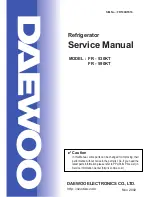
17
i.
Humming sounds
from a fully enclosed aggregate unit indicate that the motor was
not started properly.
ii.
Clattering sounds
from the start relay indicate that the start contacts cannot be
released normally.
iii.
Whistling sounds
indicate the release of high-pressure gas from a crack in the
pressure tube inside the compressor.
iv.
Clucking sounds
indicate that the suspended spring inside the compressor has
broken
v.
Knocking sounds
from inside the compressor indicates that a large quantity of
moist refrigerant vapor or refrigerating oil has linked into the compressor cylinder.
vi.
Striking sounds
from metal parts inside the compressor indicate that moving parts
are loose.
b) Listen to the gas flowing in the evaporator by opening the refrigerator door while the
compressor is in operation. Normally, refrigerant circulating in the evaporator
produces a gentle whistling accompanied by a sound similar to water flowing. If only
the whistling can be heard and there is no sound similar to water flowing, then the
refrigerant has already percolated. If neither sound can be heard, the filter or capillary
is clogged.
.
Touch and Feel
a) Feel the compressor while it is running. Its temperature should be less than 194ºF. Its
temperature may exceed 194ºF if it has been running for an extended period.
b) After the compressor has operated for 5~10 minutes, feel the condenser. The
temperature of its upper part should be higher than that of its lower part (or its right
part is hotter than its left part, depending on the type of condenser coil). This indicates
that the refrigerant is circulating properly. If the condenser is not hot, then the
refrigerant is leaking. If the condenser is hot for only a few minutes and then cools
down, the filter and capillary are clogged. If hot air is blown out of the forced air-
cooling condenser, the system is out of order.
c) Feel the filter’s temperature. Normally, the temperature on the filter’s surface should
be a little higher than the ambient temperature. If the filter is lower than the ambient
temperature, then the meshes of its screen are clogged. This obstructs the flow of
refrigerant and causing a drop in temperature due to throttling.
d) Feel the temperature of exhaust gas from the refrigerating system. The exhaust gas
should be extremely hot. If the refrigerator has an enclosed compressor refrigerating
system, there should be no frost or condensation on the gas suction tube. However,
frost and condensation may appear for a very short time period when immediately
after starting the machine.
Do not use only one of the indicators from the checklist above to decipher the state of













































